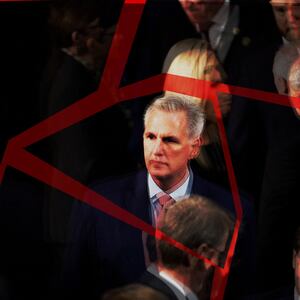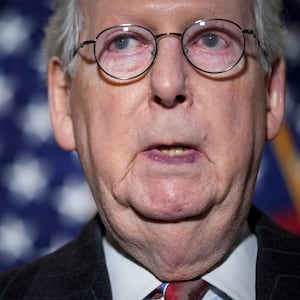The string of legislative victories that President Joe Biden is touring the country and taking credit for were made possible by a dozen or more Senate Republicans joining Democrats with GOP Senate Leader Mitch McConnell’s blessings. They are the clearest manifestation of McConnell’s plan to reconfigure himself and his party post-Trump.
He blames the ex-president for costing the GOP independents and moderates by making the Republican Party appear “nasty and tended toward chaos.”
McConnell wants to recruit better candidates for 2024, meaning non-Trumpers, in what could be his best and last chance to regain the majority before age overtakes him.
Judging by the legislative wins he allowed last year—coupled with his presence alongside Biden in Kentucky and Ohio last week touting their joint effort on infrastructure—the wily McConnell has concluded his path to victory is not the obstructionism for which he is famous. Rather, he sees a more successful path forward through selective bipartisanship.
“He loves being the adult in the room, which contrasts quite well to the House and MAGA Republicans,” says Ira Shapiro, who spent 12 years working in the Senate and is the author of the 2022 book The Betrayal: How Mitch McConnell and the Senate Republicans Abandoned America, an unrelenting portrait of a politician whose actions reduced the Senate to a hyperpartisan, gridlocked shadow of its former self.
But now, as improbable as it seems, McConnell, the grim reaper, is adopting a new, more constructive persona. The politics have shifted with Trump’s power declining, voters saying they want normalcy, and House Republicans acting zany. “McConnell sees himself at the center and able to influence outcomes,” says Shapiro. “He doesn’t favor government shutdowns and putting our full faith and credit at risk. It’s reasonable to think he would align himself with the White House as opposed to the MAGA Republicans. No question McConnell is a more constructive player than Trump and the MAGA Republicans, but that’s a low bar. Compared to the great Senate leaders of the past, he’s a terrible failure.”
After Republican extremists tried repeatedly to sabotage the election of a new speaker, McConnell is seen as someone more open to working with the White House than with the House renegades, whose “message” bills on abortion and/or cutting entitlement programs will end up in the Senate graveyard he was once so proud of tending.
McConnell’s goals are to regain the Senate majority, to win back the White House for the Republicans, and to some extent he must be thinking about his legacy. He turned 80 last year, “and while guilt doesn’t often enter into his calculation, he might be motivated by regrets or guilt that he didn’t stop Trump from his assault on our democracy when there was full Republican control,” says Shapiro.
During the second impeachment of Trump, McConnell refused to allow any witnesses and delayed the proceeding until Trump had left office—only to then declare it unconstitutional to impeach an ex-president. Seven Republicans voted to convict Trump, 10 short of the 17 needed. If McConnell had sanctioned conviction, there would have been a different outcome.
His calculation then was that Trump was too strong to be taken down by his party, and that too is changing. McConnell is speaking out more, condemning Trump for the poor candidate quality that dashed GOP hopes in the midterms, for dining with an antisemite and a white supremacist, and for saying the U.S. Constitution should be terminated. “He detests Trump,” says Shapiro, and now he sees political advantage in aligning himself against the former president.
Sen. Debbie Stabenow (D-MI)’s announcement that she will not run for re-election in 2024 adds to an already complicated Senate map for Democrats. Three Democrats are running in red states, Montana, Ohio, and West Virginia, and there are key races in Pennsylvania and Arizona—any one of which could break for the GOP if they get free of Trump and field mainstream candidates.
This is not the first time the Senate has turned on a dime because McConnell changed his approach, says Shapiro. His previous constructive period was in 2015, after the Democrats lost the Senate in the 2014 midterms, and McConnell became majority leader. After six years of scorched-earth opposition to President Barack Obama, McConnell opened the spigot and allowed a series of bipartisan measures to get through.
McConnell seemed to enjoy the experience, calling working cooperatively with the White House to secure Trade Promotion Authority for Obama “something of an out-of-body experience,” and with wry humor observing that the Senate, once a legislative graveyard, now looked “like an Amazon fulfillment center.”
That constructive period ended when Supreme Court Justice Antonin Scalia died suddenly in February 2016. McConnell corrupted the confirmation process by refusing to consider Obama’s nominee, Merrick Garland, and allowing the seat to be filled by Neil Gorsuch, who Trump appointed after winning the 2016 election. Then, after Ruth Bader Ginsburg died in September 2020, McConnell rushed Amy Coney Barrett to confirmation eight days before the 2020 election.
Shapiro chooses his words carefully as he commends the more constructive role that the Senate’s consummate tactician is adopting. It’s smart politics to advance McConnell’s goal of regaining the Senate majority.
When a friend asked him if there is anything McConnell could do to make him forgive him for the obstruction and the gridlock he inflicted, Shapiro replied, “He could denounce the Supreme Court for going too far,” quickly adding, “But that’s not going to happen. We’ve been living in Mitch McConnell’s America for a long time, and that’s going to continue.”
However much McConnell burnishes his record, his legacy remains a Supreme Court stacked with Trump appointees.









